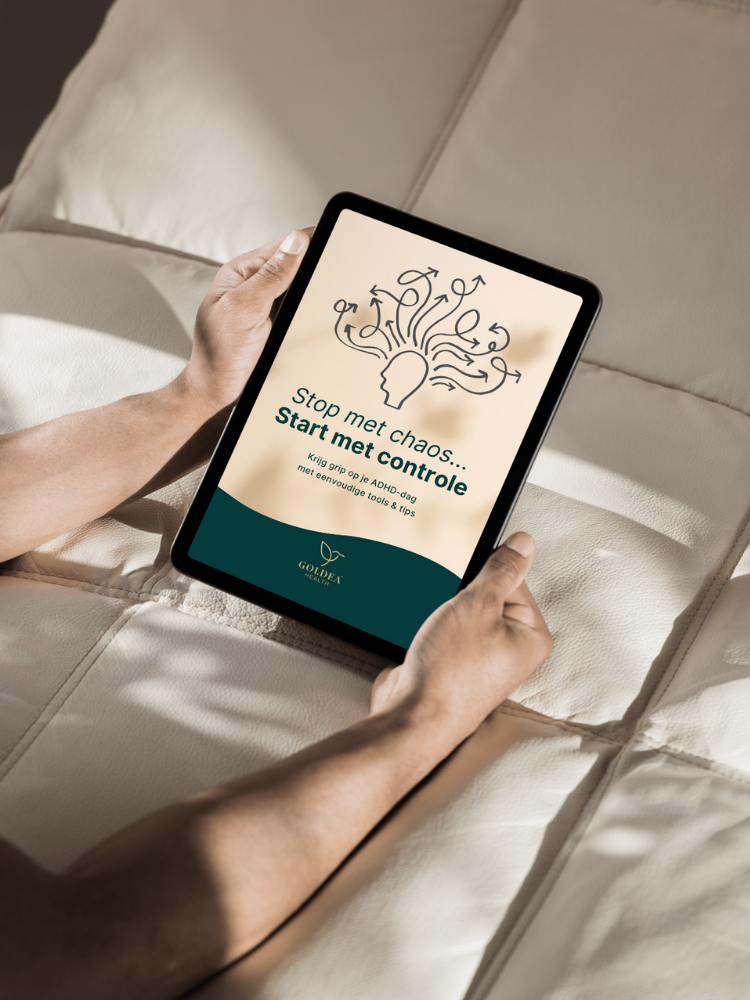Reading time: 11 minutes
Did you know that zinc is found in every cell of your body? But that's not all: zinc is also found in the soil, in your food, and even in the smartphone or computer you're reading this article on! This small but powerful mineral is found virtually everywhere and plays a huge role in your health. At Goldea Health, we're always looking for ways to support your body with natural nutrients, and zinc is a perfect example. In this blog post, we'll delve deeper into what zinc is and what it's good for , how to recognize a deficiency, and how to ensure you get enough zinc.
What is zinc?
Zinc is a mineral found everywhere around us and in our bodies. After iron, it's the most abundant trace element in our bodies and is involved in over 300 enzymatic reactions . This makes zinc essential for healthy bodily function. Although we often associate zinc with the silvery-gray metal used in industry, it plays a completely different role in our body's biochemistry.
Our bodies cannot produce zinc on their own , meaning we must obtain it through food or supplements. The question of what zinc is and what it's good for is therefore essential for anyone who takes their health seriously. Zinc is crucial for metabolism, protein synthesis, and the normal functioning of our immune system .
What is zinc good for?
Zinc performs a wide range of functions in the body.
Here are some key reasons why zinc is important for your health:
-
Immune system support : Zinc plays a key role in the development and function of immune cells, such as T lymphocytes. Therefore, zinc contributes to a strong immune system and can help ward off infections and diseases.
-
Healthy metabolism : Zinc is involved in the metabolism of carbohydrates, proteins, and fats. This makes zinc essential for energy production and maintaining a healthy body weight.
-
Skin, hair, and nails : Zinc contributes to collagen production, which is important for healthy skin. It promotes wound healing and can help with skin conditions like acne. Zinc also supports hair growth and nail strength.
-
Hormone balance : Zinc is involved in the production of hormones like insulin and testosterone. Adequate zinc intake can help maintain healthy hormone balance, which is essential for both men and women.
-
Cognitive function : Zinc supports normal cognitive function and contributes to the protection of brain cells from oxidative stress. This is important for maintaining good memory and concentration.
-
Fertility and reproduction : Zinc plays a crucial role in fertility, both for men and women. It is involved in sperm production and contributes to healthy egg quality.
-
Bone Health : Zinc is essential for bone formation and mineralization, which helps maintain strong bones, especially as we age.
What does zinc do in your body?
The answer to what zinc is and what it's good for can't be complete without understanding what zinc does in your body. Zinc supports a wide range of biological processes, including:
-
Cell division and growth : Zinc is essential for cell division and growth, which is important for wound healing and tissue repair.
-
Antioxidant Protection : Zinc acts as an antioxidant, helping protect the body from free radicals, which can damage cells and tissues.
-
Digestive support : Zinc plays a role in the production of digestive enzymes and helps maintain a healthy intestinal lining.
-
Promoting vision : Zinc is essential for vision and helps protect the eyes from age-related macular degeneration.
-
Metabolism support : Zinc is involved in the metabolism of macronutrients, fatty acids, and vitamin A, which is important for good nutritional status and energy balance.
Mineral Competition: The Balance Between Zinc and Other Minerals
Minerals are absorbed in the body in the same way, which can lead to competition between different minerals, such as zinc and iron. Too much of one mineral can reduce the absorption of another. This phenomenon, known as mineral competition, makes it important to find a good balance in your mineral intake.
One of the key questions about what zinc is and what it's good for is how to ensure you get enough zinc without deficient other minerals. This emphasizes the importance of a balanced diet and, if necessary, the appropriate use of supplements.
Tip: always take the Vegan Multi if you take zinc for a long period of time.
What contains zinc?
Zinc is found in a variety of foods. Animal products such as meat, cheese, and shellfish are particularly rich in zinc and are also better absorbed by the body than zinc from plant sources.
It is important for vegetarians and vegans to have enough Eat plant foods rich in zinc, such as nuts, seeds , and whole grains . However, zinc absorption from plant sources can sometimes be challenging due to the presence of phytates , which can inhibit zinc absorption.
Tip: take the Power 4 Zinc .
How much zinc do you need per day?
The recommended daily allowance (RDA) for zinc varies by age and gender. Here are the guidelines:
- Children : 5-7 mg per day
- Men : 9-12 mg per day
- Women : 7-9 mg per day
- Pregnant women : 9.1 mg per day
- Breastfeeding women : 11 mg per day
Do I need extra zinc on a plant-based diet?
If you follow a completely plant-based diet, you likely have an increased need for zinc. This is because plant foods often contain phytates , which reduce zinc absorption.
In this case, consider a zinc supplement to ensure you meet your daily needs. Click here for Power 4 Zinc .
Zinc Deficiency: How Do You Recognize a Zinc Deficiency?
Zinc deficiency can cause several symptoms, including:
- Skin abnormalities, such as eczema or delayed wound healing
- Decreased taste and smell
- Growth retardation in children
- Reduced immunity, which can lead to more frequent infections
- Night blindness
Although severe zinc deficiency is rare in the Netherlands, mild deficiency can be more common, especially in people with a limited diet or certain medical conditions, such as:
Can you have too much zinc?
Although zinc is essential, too much can be harmful. Symptoms of a zinc overdose include nausea, vomiting, abdominal cramps , and diarrhea . Long-term excessive zinc intake can lead to copper deficiency and even cause anemia.
Tip: you can prevent this by taking the Vegan Multi in addition to zinc.
The European Food Safety Authority (EFSA) has established an upper limit for zinc intake by age, ranging from 7 mg for young children to 25 mg for adults . It is important to adhere to these limits.
When is it wise to take extra zinc?
You may need extra zinc in several situations, such as:
- Pregnancy and breastfeeding : During these periods, the need for zinc is increased to support the baby's growth and development.
- Certain medical conditions : People with bowel disease, alcoholism, or who take certain medications may benefit from extra zinc.
- Plant-Based Diet : As discussed previously, a plant-based diet can reduce zinc absorption, so supplementation may be useful.
When is it better not to take extra zinc?
Zinc supplements can reduce the absorption of other minerals, such as copper and iron, due to mineral competition. They can also interfere with certain medications, such as antibiotics and diuretics. Therefore, it's important to always take zinc supplements at intervals between other minerals and medications, and if in doubt, consult a doctor and/or therapist.
Conclusion
Zinc is an essential mineral that plays a key role in numerous biological processes in the body. It supports your immune system, promotes healthy skin, contributes to a healthy metabolism, and is important for hormone balance and fertility. Whether you get enough zinc through your diet or choose a supplement , it's important to find a good balance and be mindful of any potential mineral competition.
We hope that after reading this blog, you have a better understanding of what zinc is, what it is good for , and how you can integrate this important mineral into your daily routine.
Do you have any questions?
We believe that we can make the world a little healthier by inspiring, sharing knowledge and motivating people towards a healthy lifestyle.
Request personal adviceNeed more inspiration?
Visit our Instagram page or check out our other recipes and blogs for more healthy and tasty ideas.
Sources
- National Institutes of Health (NIH) - Office of Dietary Supplements
Zinc - Fact Sheet for Health Professionals - PubMed - US National Library of Medicine
Research articles on Zinc and its role in human health - European Food Safety Authority (EFSA)
Scientific Opinion on Dietary Reference Values for Zinc - Harvard TH Chan School of Public Health - The Nutrition Source
Zinc - Mayo Clinic
Zinc Supplements: Uses and Side Effects - Orthomolecular Medicine News Service
Zinc and its Role in Immune Function - Linus Pauling Institute - Micronutrient Information Center
Zinc - Naturopathic Doctor News & Review (NDNR)
Zinc in Naturopathic Medicine - The American Association of Naturopathic Physicians (AANP)
Zinc: An Essential Mineral - World Health Organization (WHO)
Trace Elements in Human Nutrition and Health



